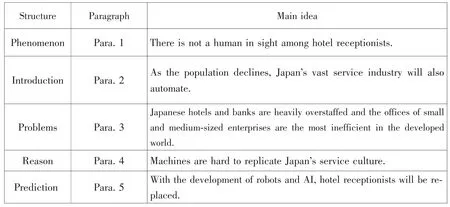Manufacturing in most rich countries
江苏河海大学 李劲松

海词积累
1.intimidate(Para. 1)vt.恐吓;威胁
2.snarl(Para. 1)vi.(动物) 龇牙低吼
3.concierge(Para. 1)n.旅馆服务员
4.anchor(Para. 2)n.节目主持人
5.android(Para. 2)n.人形机器人
6.demographic(Para. 3)n.人口统计
7.crunch(Para. 3)n.(突发的)不足;短缺
8.chide(Para. 3)vt.责备;指责;批评
9.gimmicky(Para. 4)adj.耍花招的
10.glitch(Para. 4)n.小故障;小差错
11.surplus(Para. 5)n.过剩
原文复现
Hotel receptionists are rarely thisintimidating. Yellow eyes glare as the room number issnarledthrough razor-sharp teeth. The mechanical T-Rex behind the counter is one of nine types of robots whirring and clicking through the building, from the silicon fish that swim around a tank in the lobby to the egg-shapedconciergethat controls the lights and heating in each of the 100 rooms.There is not a human in sight.
Machines already do much of the dangerous and repetitive work in Japanese factories, which have one of the highest densities of industrial robots in the world: 303 per 10,000 employees. As the population declines, Japan's vast service industry will also automate, predicts Hiroshi Ishiguro, a roboticist at Osaka University. Robots will look after the elderly, teach children and read the evening news. Televisionanchorsresembleandroidsanyway, he jokes.
Yet the future has been slow to arrive. Japanese hotels and banks are, by global standards,heavily overstaffed despite the country'sdemographic crunch. Most supermarkets have not embraced the automated checkouts common elsewhere, nor airlines self-service check-ins.The offices of Japan's small and medium-sized enterprises are among the most inefficient in the developed world,chidesMcKinsey, a management consultancy.
①Japan has an elaborate service culture,which machines struggle to replicate.②Japanese customers, especially the elderly, strongly prefer people to machines, says Yoko Takeda of Mitsubishi Research Institute, a think-tank. ③Employment practices make it difficult to replace workers. ④And whilegimmickyrobots abound, Japan struggles to develop the software and artificial intelligence needed to enable them to perform useful tasks, says a report by the Ministry of Economy, Trade and Industry, the cockpit(战场) of Japan's post-war miracle. ⑤So while the reception at the robot hotel is automated, seven human employees lurk (潜伏)out of sight to watch over customers and avoidglitches. ⑥Robots still cannot make beds, cook breakfast or deal with a drunken guest who will not pay his bill.
By 2030, as robots and AI eliminate such jobs, Ms Takeda forecasts, Japan will have asurplusof lowlier workers. She still believes immigrants will be needed, but only in certain skilled professions. Hotel receptionists, a colleague predicts, will have gone the way of the dinosaur.
——From:The Economist
Part 1 整体感知
本文是一篇议论文,简短精悍。随着人口的减少,日本庞大的服务业也将自动化。但目前发展道路还不光明,日本的酒店和银行员工还是严重过剩,并且日本中小型企业的办公室是发达国家中效率最低的。 究其原因,主要是机器很难复制日本的服务文化。 另一方面,有人预测,底层工人可能要被机器取代了。
篇章结构梳理:

典型段落段内结构分析:
Para. 4

Part 2 语言学习
一、常见词的不常用法
1.countern.柜台
He wondered if the girl behind the counter recognised him. 他在想柜台后面的那个女孩是否认出了他。
2.embracevt.欣然接受;乐意采纳
We hope these regions will embrace democratic reforms. 我们希望这些地区会乐意接受民主改革。
3.practicen.惯常做法;惯例
the practice of dumping waste into the sea倾倒废弃物入海的惯常做法
4.strugglen.很费劲的事
Losing weight was a terrible struggle. 减肥是件很费劲的事。
二、形近词
1.resistantadj.抵抗的;抵制的relevantadj.相关的
2.intimidatevt.恐吓;威胁intimateadj.亲密的
3.mechanicaladj.机械的mechanismn.机制
4.checkoutn.付款处;收银台; 结账check-inn.(在机场、宾馆、医院等)登记处;办理登记手续
5.elaborateadj.精心制作的;详尽的delicateadj.精美的;精致的
三、拟声词
1.snarl (动物) 龇牙低吼
2.whir 嗡嗡声
3.click 咔嗒声
4.quack 嘎嘎叫
5.miaow 喵喵叫
6.bark 狗吠叫
四、表示从事某项职业的人的词
1.concierge 旅馆服务员
2.roboticist 机器人专家
3.faculty (大学的)全体教员
4.plumber 管子工
5.astronaut 宇航员
6.biologist 生物学家
7.gourmet 美食家
五、写作推荐
如何用插入语:放在主语和谓语之间
Japanese customers, especially the elderly,strongly prefer people to machines, says Yoko Takeda of Mitsubishi Research Institute, a think-tank.
especially the elderly是插入语, 放在了主语和谓语之间,强调了日本消费者之中的老人群 体 。 另 :a think-tank 是Mitsubishi Research Institute的同位语。 这句话是先说内容,再介绍说话的人:...,says...。
Part 3 视角拓展
搜狗携手新华社发布全球首个AI合成主播

“大家好,我是人工智能主持人,这是我来新华社的第一天。”2018年,在中国乌镇召开的世界互联网大会上,搜狗公司和新华社联合推出了全球首例 “人工智能新闻主持人”,他们的嘴唇动作和面部表情取自新华社的两位真人主持人。据说,人工智能主持人完全不用休息,可以24 小时全天候播报新闻。该技术能通过人脸关键点检测、人脸特征提取、人脸重构、唇语识别、情感迁移等多项前沿技术,并结合语音、图像等多模态信息进行联合建模训练后,生成与真人无异的AI分身模型。这项技术让机器首次做到逼真的模拟人类说话时的声音、嘴唇动作和表情,并且将三者自然匹配,与真人几乎一致。
参考译文
发达国家的制造业之殇
宾馆招待员很少有像这样吓人的:眼珠金黄,盯着客人,牙齿像剃刀一样尖利,从中低吼出房间号码。这只站在柜台后的机器人便是宾馆九种机器人中的一个——机械霸王龙。它们在大楼里嗡嗡作声,咔咔作响,除了这只以外,前厅水池里游着条硅鱼,还有个蛋形机器人服务员控制着一百个房间的照明和暖气设备。 目光所及之处,无一人身影。
日本的工厂里许多危险和重复性的工作都已经由机器承担。 世界上使用机器人从事生产密度最高的工厂中,有一家就在其中,在那里每1万名员工就有303台机器人。 大阪大学的机器人专家石黑浩预测,随着人口的减少,日本庞大的服务业也将自动化。 机器人将用来照顾老人、教孩子,还能为主人阅读晚间新闻。 他开玩笑说,反正电视主持人也像机器人嘛。
然而,目前还是看不到未来的曙光。从全球标准来说,尽管日本面临人口危机,但日本的酒店和银行员工还是严重过剩的。大多数超市都没有采用其他地方常见的自动结账系统,航空公司也没有引进自助登记手续系统。管理咨询公司麦肯锡指出,日本中小型企业的办公室是发达国家中效率最低的。
日本有着精致的服务文化, 机器很难复制。 日本的一个智库——三菱研究所的武田洋子表示,日本消费者,尤其是老年人,往往倾向于选择人而不是机器。公司因雇佣方面的惯例很难去替换工人。 日本战后奇迹崛起的作战场——经济、贸易和工业部的一份报告称,尽管噱头十足的机器人比比皆是,但日本仍在努力开发软件和人工智能来执行很多有价值的任务。 因此,虽然机器人酒店的前台是自动化的,但却有7名员工潜伏在视线之外,监视顾客,避免出现故障。 机器人还是不能铺床、做早餐,也不能应付一个不愿付账的醉鬼。
武田女士预测,到2030年,随着机器人和人工智能的发展,这类工作岗位将不复存在,日本便会出现底层工人过剩的现象。 她仍然相信移民是必要的,但只是在某些专业技能领域。 有位员工预测,酒店接待员将步恐龙后尘(恐龙已绝迹)。

